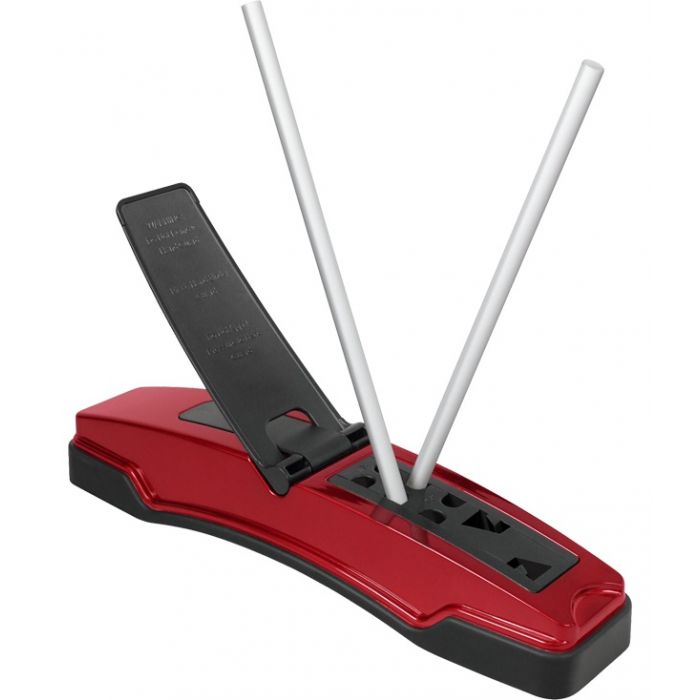In order to use this website you need to accept the use of Cookies , our Privacy Policy , and our Terms and Conditions.
Lansky Masters Edge Knife Sharpener


Description
The Master's Edge Knife Sharpening System includes a pair of both medium (grey, 800 grit) and fine (white, 1000 grit) ceramic rods for sharpening and professional grade polishing. Also included in the system is a medium ceramic triangular rod which will sharpen all types of serrations as well as awls and fish hooks. Features three of the most common sharpening angles: 17, 20 and 25, a rubber non-slip base, easy snap in rod storage, and an integrated hand guard. The Master's Edge knife sharpening system works as well on hunting knives and utility knives as it does as a kitchen knife sharpener. Looks great on a counter but also stores away easily in a drawer.
It has three pre-set rod angles designed to provide a precise edge:
17 Fine angle: for fillet and fine slicing
20 Fine angle: for slicing, butcher, paring and skinning knives.
25 Medium angle: for hunting, camping, utility and chefs knives.
Features
- Rubber non-slip base
- Easy snap in rod storage
- Integrated hand guard
- Stores away easily in a drawer
Specifications
| Brand | Lansky |
Instructions
The masters edge knife sharpener can be used for 1-stage and 2-stage sharpening, and can also be used to sharpen serrations. the round medium grey ceramic rods are for sharpening, and the round white ceramic rods are for polishing. the medium, multi angle, triangular rod is used for sharpening all types of serrations.
Set up- start by placing the master's edge on a stable and flat surface at a comfortable working height.
1 stage sharpening
Step 1- to begin sharpening, unfold the hand guard to expose the labeled guide holes. then choose the type of rods and the angle that you wish to sharpen with (17, 20 or 25) by placing the sharpening rods in the appropriate guide holes.
Step 2- hold the base firmly with your non-dominate hand. make sure to keep your hand & thumb under the hand guard.
step 3- with the knife in your dominate hand, place the heel of the blade (closest to the handle) an inch or more below the top of one of the rods.
Step 4- holding the blade straight up and down (perpendicular to the ground), draw the blade down the rod and towards you, moving towards the tip of the knife. the motion is similar to slicing bread.
Step 5- repeat this action on the other rod for the other side of the edge.
Step 6- continue alternation from rod to rod until you have achieved the desired sharpness. 10 to 20 strokes per side should be sufficient
2 stage sharpening
Step 1- follow the set up and safety instruction found in the instructions above. begin by placing the rods in the 20 angle holes and follow the sharpening instructions as listed in the 1-stage sharpening above, but do not polish/finish the edge, use only 10-12 strokes on each rod. this is to thin the blades edge.
Step 2 after thinning the blades edge, move the rods to the 25 angle holes for the 2nd stage sharpening to finish the edge. simply follow the same technique used before. this will produce a durable and sharp compound bevel.
Serration sharpening
The gray multi angle, triangular rod included in the masters edge is used for sharpening all types of serration. there are two guide holes that will accept the triangular rod. this allows sharpening either left facing or right facing serration. start by identifying the layout of your serrations (left or right), which radius of the triangular rods will best fit your serration and the proper angle to sharpen them at (most serrations are very shallow 17 is a good place to start). then insert the triangular rod into one the proper triangular guide hole. sharpen each serration individually by running each serration straight down the proper radius of the triangular rod, much like youre slicing a thin layer of the surface of the rod. finish the edge by running the rod flat against the back edge of the serrations to polish off the bur that has formed on the opposite side.
Pro tips- for the best results, use light pressure when sharpening and avoid rolling the tip of your knife off the rod. this can damage the tip and leave it duller than the rest of the blade. patience and a slow hand are recommended.
Dark lines that appear in the rod are metal particles you removed from your blade. rotate the rods when they get black to expose unused areas. when they get black all around, rods must be cleaned with a lansky eraserblock or scrubbed with kitchen cleanser. the rods will not wear with sharpening or scrubbing. the high alumina ceramic abrasive rods are tough & durable, but they are ceramic & can break if dropped on a hard surface.
| Free Shipping | No |
|---|


